关于护理考研英语资料归纳推荐
护理英语知识点总结

护理英语知识点总结本文将从护理专业常用英语词汇、护理交流中常见的句子和护理英语阅读与写作技巧这三个方面来总结护理英语知识点。
一、护理专业常用英语词汇在护理中,我们经常会用到一些专业英语词汇,下面将列举一些常用的护理英语词汇,并附上中文解释。
1. Patient care(病人护理)2. vital sign(生命体征)3. wound care(伤口护理)4. medication administration(药物管理)5. hygiene(卫生)6. nursing assessment(护理评估)7. pain management(疼痛管理)8. IV therapy(静脉输液)9. patient education(患者教育)10. discharge planning(出院计划)二、护理交流中常见的句子1. How are you feeling today?(你今天感觉怎么样?)2. What is your pain level on a scale from 1 to 10?(你的疼痛程度是多少?)3. Can you describe the symptoms you are experiencing?(你能描述一下你正在经历的症状吗?)4. It's time for your medication.(该是你服药的时间了。
)5. I will be back to check on you in a little while.(我会在一会儿回来看你。
)6. You need to get some rest to help with your recovery.(你需要休息一下以帮助康复。
)7. Let me know if you need anything.(如果你需要什么,告诉我。
)8. I'm going to take your blood pressure now.(我现在要给你测量血压。
护理英语 基础知识点总结
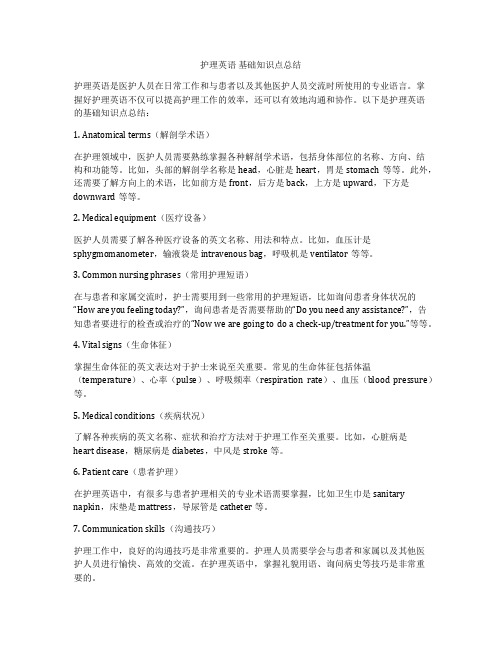
护理英语基础知识点总结护理英语是医护人员在日常工作和与患者以及其他医护人员交流时所使用的专业语言。
掌握好护理英语不仅可以提高护理工作的效率,还可以有效地沟通和协作。
以下是护理英语的基础知识点总结:1. Anatomical terms(解剖学术语)在护理领域中,医护人员需要熟练掌握各种解剖学术语,包括身体部位的名称、方向、结构和功能等。
比如,头部的解剖学名称是head,心脏是heart,胃是stomach等等。
此外,还需要了解方向上的术语,比如前方是front,后方是back,上方是upward,下方是downward等等。
2. Medical equipment(医疗设备)医护人员需要了解各种医疗设备的英文名称、用法和特点。
比如,血压计是sphygmomanometer,输液袋是intravenous bag,呼吸机是ventilator等等。
3. Common nursing phrases(常用护理短语)在与患者和家属交流时,护士需要用到一些常用的护理短语,比如询问患者身体状况的“How are you feeling today?”,询问患者是否需要帮助的“Do you need any assistance?”,告知患者要进行的检查或治疗的“Now we are going to do a check-up/treatment for you.”等等。
4. Vital signs(生命体征)掌握生命体征的英文表达对于护士来说至关重要。
常见的生命体征包括体温(temperature)、心率(pulse)、呼吸频率(respiration rate)、血压(blood pressure)等。
5. Medical conditions(疾病状况)了解各种疾病的英文名称、症状和治疗方法对于护理工作至关重要。
比如,心脏病是heart disease,糖尿病是diabetes,中风是stroke等。
2021考研双语英语阅读材料:外国人怎么护肤?
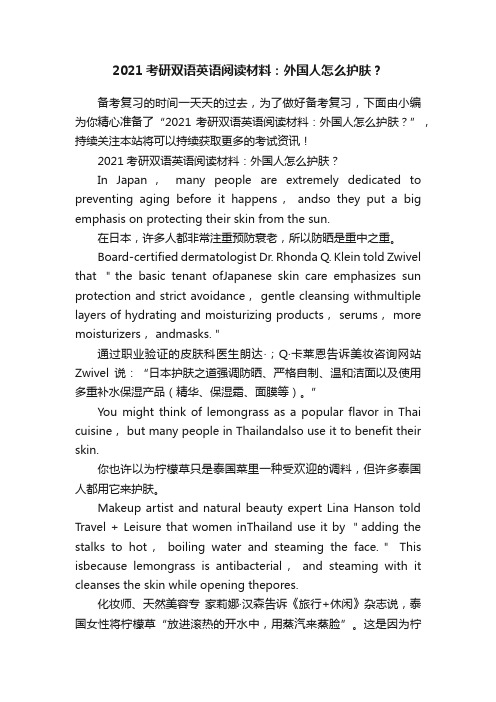
2021考研双语英语阅读材料:外国人怎么护肤?备考复习的时间一天天的过去,为了做好备考复习,下面由小编为你精心准备了“2021考研双语英语阅读材料:外国人怎么护肤?”,持续关注本站将可以持续获取更多的考试资讯!2021考研双语英语阅读材料:外国人怎么护肤?In Japan,many people are extremely dedicated to preventing aging before it happens,andso they put a big emphasis on protecting their skin from the sun.在日本,许多人都非常注重预防衰老,所以防晒是重中之重。
Board-certified dermatologist Dr. Rhonda Q. Klein told Zwivel that "the basic tenant ofJapanese skin care emphasizes sun protection and strict avoidance, gentle cleansing withmultiple layers of hydrating and moisturizing products, serums, more moisturizers, andmasks."通过职业验证的皮肤科医生朗达·;Q·卡莱恩告诉美妆咨询网站Zwivel说:“日本护肤之道强调防晒、严格自制、温和洁面以及使用多重补水保湿产品(精华、保湿霜、面膜等)。
”You might think of lemongrass as a popular flavor in Thai cuisine, but many people in Thailandalso use it to benefit their skin.你也许以为柠檬草只是泰国菜里一种受欢迎的调料,但许多泰国人都用它来护肤。
考研护理英语试题及答案
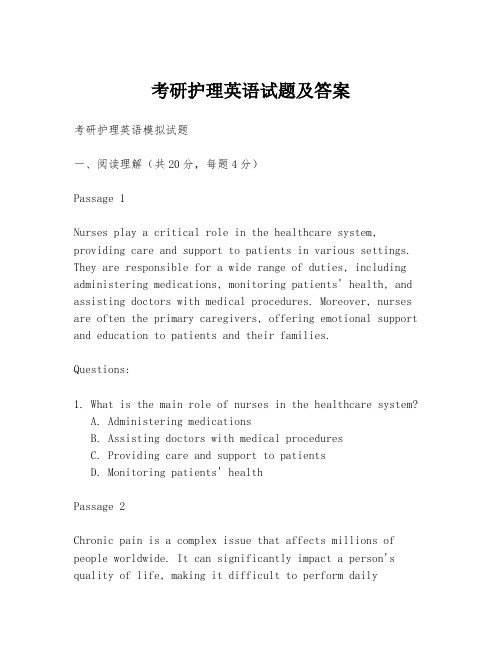
考研护理英语试题及答案考研护理英语模拟试题一、阅读理解(共20分,每题4分)Passage 1Nurses play a critical role in the healthcare system, providing care and support to patients in various settings. They are responsible for a wide range of duties, including administering medications, monitoring patients' health, and assisting doctors with medical procedures. Moreover, nurses are often the primary caregivers, offering emotional support and education to patients and their families.Questions:1. What is the main role of nurses in the healthcare system?A. Administering medicationsB. Assisting doctors with medical proceduresC. Providing care and support to patientsD. Monitoring patients' healthPassage 2Chronic pain is a complex issue that affects millions of people worldwide. It can significantly impact a person's quality of life, making it difficult to perform dailyactivities. Nurses are often on the front line in managing chronic pain, using a combination of pharmacological and non-pharmacological interventions. These may include medication, physical therapy, and counseling to help patients cope with their condition.Questions:2. What is the impact of chronic pain on a person's life?A. It improves daily activitiesB. It makes daily activities difficultC. It has no significant impactD. It is a temporary issue3. Which of the following is NOT a method used by nurses to manage chronic pain?A. MedicationB. Physical therapyC. CounselingD. Surgery二、完形填空(共15分,每题3分)In recent years, the nursing profession has undergone significant changes. The role of the nurse has evolved from one of mere obedience to doctors' orders to a more __4__ role where they provide critical thinking and decision-making skills. This shift has been driven by the increasing complexity of patient care and the need for __5__ care.4. A. passiveB. activeC. dependentD. independent5. A. cost-effectiveB. specializedC. personalizedD. generalized三、翻译(共25分,英译汉10分,汉译英15分)英译汉:Translate the following paragraph into Chinese."Nursing ethics is a branch of medical ethics that specifically deals with the moral principles and values that guide the actions of nurses. It is essential for nurses to uphold these ethical standards to ensure the best possible care for their patients."汉译英:将以下段落翻译成英文。
大学医学英语教材推荐
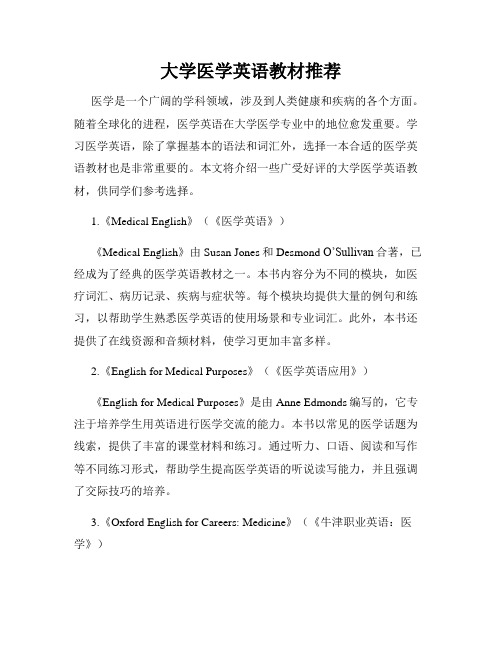
大学医学英语教材推荐医学是一个广阔的学科领域,涉及到人类健康和疾病的各个方面。
随着全球化的进程,医学英语在大学医学专业中的地位愈发重要。
学习医学英语,除了掌握基本的语法和词汇外,选择一本合适的医学英语教材也是非常重要的。
本文将介绍一些广受好评的大学医学英语教材,供同学们参考选择。
1.《Medical English》(《医学英语》)《Medical English》由Susan Jones和Desmond O’Sullivan合著,已经成为了经典的医学英语教材之一。
本书内容分为不同的模块,如医疗词汇、病历记录、疾病与症状等。
每个模块均提供大量的例句和练习,以帮助学生熟悉医学英语的使用场景和专业词汇。
此外,本书还提供了在线资源和音频材料,使学习更加丰富多样。
2.《English for Medical Purposes》(《医学英语应用》)《English for Medical Purposes》是由Anne Edmonds编写的,它专注于培养学生用英语进行医学交流的能力。
本书以常见的医学话题为线索,提供了丰富的课堂材料和练习。
通过听力、口语、阅读和写作等不同练习形式,帮助学生提高医学英语的听说读写能力,并且强调了交际技巧的培养。
3.《Oxford English for Careers: Medicine》(《牛津职业英语:医学》)《Oxford English for Careers: Medicine》是针对有意从事医疗行业的学生设计的一本教材。
该书内容包括医学术语、病历记录、医学会话等常见话题。
除了提供课堂材料和练习外,该书还包含了一些真实案例和专业背景知识,帮助学生了解医学实践的背景和文化。
4.《Cambridge English for Nursing》(《剑桥护理英语》)《Cambridge English for Nursing》是针对想要从事护理行业的学生设计的教材。
本书内容紧密围绕护理实践展开,包括基本的护理知识、护理技巧、医患交流等方面。
考研护理专业英语知识点串讲
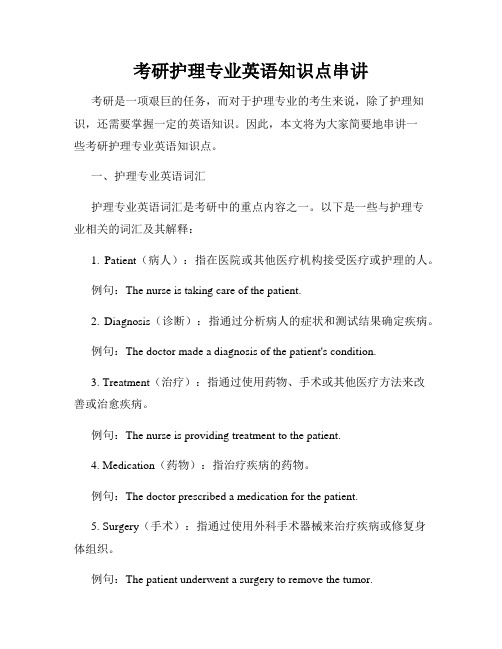
考研护理专业英语知识点串讲考研是一项艰巨的任务,而对于护理专业的考生来说,除了护理知识,还需要掌握一定的英语知识。
因此,本文将为大家简要地串讲一些考研护理专业英语知识点。
一、护理专业英语词汇护理专业英语词汇是考研中的重点内容之一。
以下是一些与护理专业相关的词汇及其解释:1. Patient(病人):指在医院或其他医疗机构接受医疗或护理的人。
例句:The nurse is taking care of the patient.2. Diagnosis(诊断):指通过分析病人的症状和测试结果确定疾病。
例句:The doctor made a diagnosis of the patient's condition.3. Treatment(治疗):指通过使用药物、手术或其他医疗方法来改善或治愈疾病。
例句:The nurse is providing treatment to the patient.4. Medication(药物):指治疗疾病的药物。
例句:The doctor prescribed a medication for the patient.5. Surgery(手术):指通过使用外科手术器械来治疗疾病或修复身体组织。
例句:The patient underwent a surgery to remove the tumor.二、护理专业英语语法除了词汇,英语语法也是考研护理专业的重要知识点。
以下是一些常用的护理专业英语语法:1. Passive voice(被动语态):在护理专业中,被动语态常用于强调行为的接受者。
例句:The patient was taken to the operating room.2. Conditional sentences(条件句):护理专业中常使用条件句来描述患者的病情和可能的结果。
例句:If the patient's condition worsens, they will be transferred to the intensive care unit.3. Comparative and superlative forms(比较级和最高级):用于描述不同护理方法或患者的状态等级。
护理考研题库书推荐

护理考研题库书推荐护理学是医学领域中一个重要且不断发展的学科,考研是许多护理专业学生进一步深造的选择。
选择合适的护理考研题库书籍对于备考至关重要。
以下是一些推荐的护理考研题库书籍,它们涵盖了护理学的基本理论、实践技能以及考研所需的各类知识点。
《护理学考研题库与解析》这本书由资深护理教育专家编写,内容全面,覆盖了护理学的基础理论、临床护理、护理管理等多个方面。
书中不仅提供了大量的练习题,还附有详细的解析,帮助学生深入理解知识点,提高解题能力。
《护理学考研全真模拟试题集》这本模拟试题集模拟了真实的考研环境,题目设计贴近历年考研真题,有助于学生熟悉考试题型和考试节奏。
通过模拟练习,学生可以检验自己的学习效果,及时调整复习策略。
《护理学考研核心考点精讲精练》这本书侧重于护理学的核心知识点,通过精讲精练的方式,帮助学生掌握重点和难点。
书中的练习题和解析紧密结合,有助于学生巩固记忆,提高应试技巧。
《护理学考研综合能力提升教程》这本教程不仅包含了护理学的基础知识点,还特别强调了综合能力的培养,如临床思维、护理操作技能等。
书中的案例分析和实践操作指导,有助于学生将理论知识应用于实际工作中。
《护理学考研历年真题解析与应试技巧》历年真题是考研复习的重要资源。
这本书收集了近年来的考研真题,并提供了详细的解析和应试技巧,帮助学生了解考试趋势,掌握答题技巧。
《护理学考研英语词汇与阅读理解专项训练》对于护理学考研的学生来说,英语能力同样重要。
这本书专门针对护理学考研英语部分,提供了词汇学习和阅读理解的专项训练,帮助学生提高英语水平。
在准备考研的过程中,选择合适的题库书籍只是第一步。
学生还需要制定合理的学习计划,持之以恒地复习,同时注意调整心态,保持良好的学习状态。
希望以上的推荐能够帮助到正在准备护理学考研的同学们。
预祝大家考研成功!。
护理考研英语题型

护理考研英语题型全文共四篇示例,供读者参考第一篇示例:近年来,随着人们对健康关注的增加,护理专业成为了热门的考研专业之一。
而在护理考研中,英语作为重要的考试科目之一,其题型也是多种多样的。
本文将为大家介绍一下护理考研英语题型及应对策略。
首先是护理考研英语的阅读理解题型。
这种题型在考试中所占比重较大,一般占总分的30%左右。
阅读理解题型通常包括阅读一篇文章或几篇相关文章,然后回答一些相关问题。
针对这种题型,考生需要具备良好的阅读能力和快速定位能力。
在备考过程中,考生可以选择多读一些相关的英文文章、资料,提升自己的阅读理解能力。
也可以多做一些题型练习,熟悉常见的题型,提高解题速度和准确率。
其次是护理考研英语的填空题型。
这种题型一般包括单词填空和句子填空两种形式。
对于单词填空,考生需要熟练掌握一些常见的医学术语和专业词汇,以便能够正确填写空白处。
对于句子填空,则需要考生在理解句子整体意思的基础上,选择合适的词汇填入空白处,使得句子通顺连贯。
在备考过程中,考生可以多背诵一些常见的医学术语和专业词汇,同时也可以多做一些相关的填空练习,提高自己的词汇量和填空能力。
最后是护理考研英语的写作题型。
这种题型一般包括写作一篇文章或一份短文,要求考生根据题目给出的要求写出相关内容。
写作题型考察考生的英文表达能力和逻辑思维能力。
在备考过程中,考生可以多练习写作一些相关的短文或文章,提高自己的写作能力和表达能力。
护理考研英语题型多样,考生需要全面提升自己的听、说、读、写能力,以应对考试中的各种题型。
通过多练习、多积累、多总结,相信大家一定能够在护理考研英语中取得好成绩。
希望本文对大家有所帮助,祝大家考试顺利!第二篇示例:护理考研英语是护理专业的研究生考试科目之一,主要考察学生在英语听、说、读、写、译等方面的能力。
针对护理考研英语题型,主要包括阅读理解、完形填空、词汇填空、短文改错等题型。
下面我们来详细了解一下。
首先是阅读理解题型,这是考察考生阅读理解能力的题型。
医学英语考试复习资料

医学英语考试复习资料一、词汇医学英语词汇量大且专业性强,是复习的重点之一。
1、词根词缀许多医学词汇都由词根、前缀和后缀组成。
例如,“cardio”表示“心脏”,“itis”表示“炎症”,那么“carditis”就是“心肌炎”。
了解常见的词根词缀可以帮助我们推测和记忆生词。
2、专业术语掌握常见的医学专业术语,如解剖学、生理学、病理学、药理学等方面的词汇。
例如,“anatomy(解剖学)”“physiology(生理学)”“pathology(病理学)”“pharmacology(药理学)”等。
3、缩略词医学领域中有大量的缩略词,如“ECG(心电图)”“MRI(磁共振成像)”“ICU(重症监护病房)”等。
需要熟悉这些缩略词的全称和含义。
二、语法1、名词的单复数医学英语中名词的单复数形式有其特殊规则。
例如,“bacterium(细菌,单数)”“bacteria(细菌,复数)”。
2、动词时态在描述医学研究、病例报告等时,要正确使用动词的时态,一般过去时和现在完成时较为常见。
3、被动语态由于医学研究和实践中更强调客观事实,被动语态的使用较为频繁。
三、阅读1、医学文献阅读医学期刊、研究报告等,提高对专业文章的理解能力。
注意文章的结构、段落主旨和关键词。
2、病例分析通过阅读病例分析,了解医学英语在实际临床中的应用,同时熟悉相关的疾病名称、症状描述和治疗方法。
四、写作1、医学报告练习撰写医学报告,包括病例报告、实验报告等,注意格式规范、语言准确和逻辑清晰。
2、摘要写作学会提炼医学文献的主要内容,写出简洁准确的摘要。
五、听力1、医学讲座收听医学专业的讲座录音,提高听力理解能力,熟悉医学领域的常用表达和发音。
2、模拟听力测试进行模拟听力测试,熟悉考试题型和节奏。
六、口语1、医患对话模拟医患之间的对话场景,练习用医学英语进行交流。
2、学术讨论参与医学英语的学术讨论,锻炼表达观点和回应他人的能力。
七、常见疾病和症状的表达1、心血管疾病如“heart attack(心脏病发作)”“hypertension(高血压)”“atherosclerosis(动脉粥样硬化)”等。
英语考研推荐复习资料
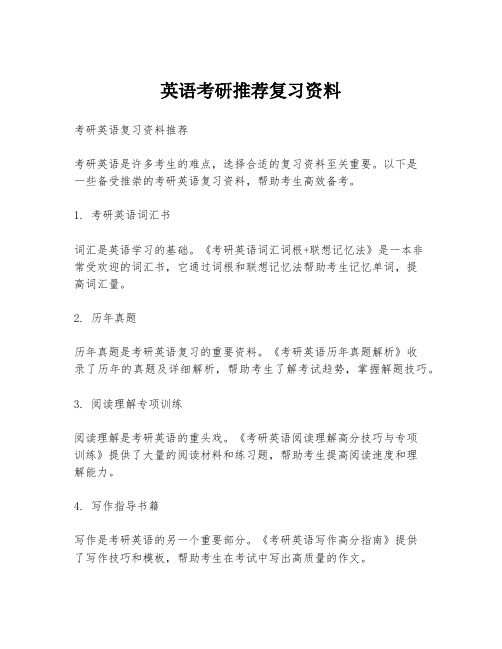
英语考研推荐复习资料考研英语复习资料推荐考研英语是许多考生的难点,选择合适的复习资料至关重要。
以下是一些备受推崇的考研英语复习资料,帮助考生高效备考。
1. 考研英语词汇书词汇是英语学习的基础。
《考研英语词汇词根+联想记忆法》是一本非常受欢迎的词汇书,它通过词根和联想记忆法帮助考生记忆单词,提高词汇量。
2. 历年真题历年真题是考研英语复习的重要资料。
《考研英语历年真题解析》收录了历年的真题及详细解析,帮助考生了解考试趋势,掌握解题技巧。
3. 阅读理解专项训练阅读理解是考研英语的重头戏。
《考研英语阅读理解高分技巧与专项训练》提供了大量的阅读材料和练习题,帮助考生提高阅读速度和理解能力。
4. 写作指导书籍写作是考研英语的另一个重要部分。
《考研英语写作高分指南》提供了写作技巧和模板,帮助考生在考试中写出高质量的作文。
5. 听力训练材料听力是考研英语的另一个难点。
《考研英语听力强化训练》提供了丰富的听力材料和练习题,帮助考生提高听力水平。
6. 模拟试题模拟试题可以帮助考生检验复习效果。
《考研英语模拟试题及解析》提供了多套模拟试题和详细解析,帮助考生查漏补缺。
7. 网络资源除了纸质资料,网络上也有很多优质的考研英语复习资源。
例如,新东方在线、沪江英语等网站提供了大量的考研英语学习资料和在线课程。
8. 考研英语APP随着科技的发展,考研英语APP也成为了考生复习的重要工具。
例如,扇贝单词、百词斩等APP提供了丰富的词汇学习和复习功能。
总之,考研英语复习需要综合运用多种资料和方法。
考生可以根据自己的实际情况,选择适合自己的复习资料,制定合理的复习计划,坚持不懈地学习,相信一定能够取得理想的成绩。
护理考研题库书籍推荐最新

护理考研题库书籍推荐最新
1. 《护理学考研题库与解析》
- 这本书涵盖了护理学基础知识点,包括内科护理、外科护理、妇产科护理等,题库丰富,解析详尽,适合作为日常练习和复习使用。
2. 《护理专业考研全真模拟试题集》
- 该书提供了大量的模拟试题,模拟真实考试环境,帮助考生熟悉考试流程和题型,增强应试能力。
3. 《护理考研历年真题解析》
- 历年真题是了解考试趋势和重点的重要资料。
这本书收集了近几年的真题,并配有详细的解析,有助于考生把握考试重点。
4. 《护理学专业课考研指导与题库》
- 这本书不仅提供了题库,还包含了专业课的复习指导,帮助考生系统地复习专业知识,提高答题技巧。
5. 《护理考研核心考点精讲精练》
- 该书专注于护理学的核心考点,通过精讲精练的方式,帮助考生深入理解和掌握重要知识点。
6. 《护理考研辅导与全真模拟试题》
- 这本书结合了辅导和模拟试题,适合考生在复习的后期使用,以检验自己的学习成果。
7. 《护理学考研冲刺题库》
- 适合考前冲刺阶段使用,题库精炼,覆盖面广,有助于考生在最后阶段查漏补缺。
使用建议
- 在使用这些题库书籍时,建议考生结合自己的实际情况,有针对性地选择适合自己的书籍。
- 定期进行自我测试,以了解自己的掌握程度和需要加强的部分。
- 除了做题,也要注重理论知识的学习,确保理论与实践相结合。
结语
选择合适的护理考研题库书籍是成功备考的关键之一。
希望以上的推荐能够帮助到每一位护理专业的考研学子,祝愿大家在考研的道路上取得优异的成绩。
护理在职考研英语零基础备考计划
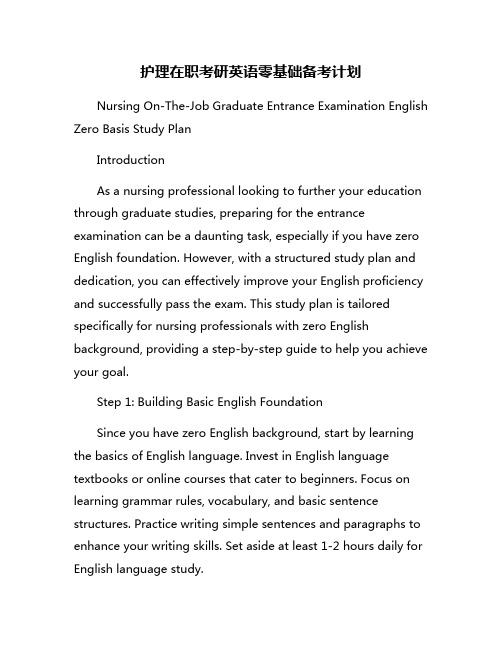
护理在职考研英语零基础备考计划Nursing On-The-Job Graduate Entrance Examination English Zero Basis Study PlanIntroductionAs a nursing professional looking to further your education through graduate studies, preparing for the entrance examination can be a daunting task, especially if you have zero English foundation. However, with a structured study plan and dedication, you can effectively improve your English proficiency and successfully pass the exam. This study plan is tailored specifically for nursing professionals with zero English background, providing a step-by-step guide to help you achieve your goal.Step 1: Building Basic English FoundationSince you have zero English background, start by learning the basics of English language. Invest in English language textbooks or online courses that cater to beginners. Focus on learning grammar rules, vocabulary, and basic sentence structures. Practice writing simple sentences and paragraphs to enhance your writing skills. Set aside at least 1-2 hours daily for English language study.Step 2: Enhancing Listening and Speaking SkillsTo improve your listening and speaking skills, watch English movies, TV shows, or listen to podcasts. Pay attention to the pronunciation, intonation, and accents of native speakers. Practice speaking in English with colleagues or friends who are proficient in the language. Join English conversation groups or language exchange programs to practice speaking with native speakers.Step 3: Reading Comprehension PracticeReading comprehension is a crucial component of the entrance examination. Start by reading English newspapers, magazines, or online articles on a variety of topics. Focus on understanding the main ideas, key points, and vocabulary in the texts. Practice summarizing the texts in your own words to improve your comprehension skills.Step 4: Writing PracticeDeveloping your writing skills is essential for the entrance examination. Practice writing essays, reports, or short stories on different topics. Focus on structuring your writing, using appropriate grammar and vocabulary, and expressing your ideasclearly. Ask for feedback from English proficient colleagues or teachers to improve your writing skills.Step 5: Mock Exams and Practice TestsTo prepare for the entrance examination, practice solving mock exams and practice tests. Familiarize yourself with the format of the exam, types of questions, and time limits. Identify your strengths and weaknesses and focus on improving areas where you need more practice. Set aside dedicated time for regular mock exams and review your performance to track your progress.ConclusionWith a structured study plan and consistent practice, you can improve your English proficiency and successfully prepare for the entrance examination. Stay motivated, set realistic goals, and stay committed to your study plan. Remember that success comes with dedication and hard work. Good luck with your preparation and may you achieve your goal of entering graduate school!。
护理考研英语范文
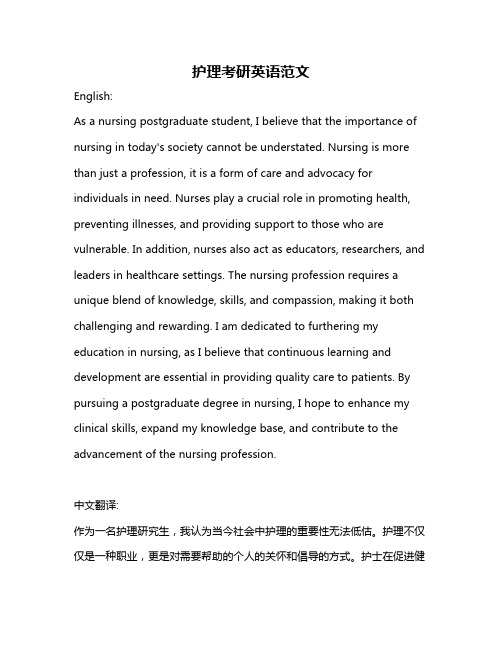
护理考研英语范文English:As a nursing postgraduate student, I believe that the importance of nursing in today's society cannot be understated. Nursing is more than just a profession, it is a form of care and advocacy for individuals in need. Nurses play a crucial role in promoting health, preventing illnesses, and providing support to those who are vulnerable. In addition, nurses also act as educators, researchers, and leaders in healthcare settings. The nursing profession requires a unique blend of knowledge, skills, and compassion, making it both challenging and rewarding. I am dedicated to furthering my education in nursing, as I believe that continuous learning and development are essential in providing quality care to patients. By pursuing a postgraduate degree in nursing, I hope to enhance my clinical skills, expand my knowledge base, and contribute to the advancement of the nursing profession.中文翻译:作为一名护理研究生,我认为当今社会中护理的重要性无法低估。
考研护理英语试题及答案

考研护理英语试题及答案一、选择题(每题2分,共20分)1. What is the most common symptom of a urinary tract infection?A. FeverB. CoughC. Chest painD. Dysuria2. Which of the following is a risk factor for developing pressure ulcers?A. SmokingB. ObesityC. MalnutritionD. All of the above3. The primary goal of pain management in nursing is to:A. Administer medication on timeB. Ensure patient comfortC. Document pain levels accuratelyD. Prevent pain from escalating4. Which nursing intervention is appropriate for a patient with a high risk of falls?A. Remove all obstacles from the patient's environmentB. Encourage the patient to ambulate independentlyC. Provide a bed alarm and instruct the patient to call for assistanceD. Restrict the patient's mobility to prevent falls5. The nursing process includes the following steps except:A. AssessmentB. PlanningC. ImplementationD. Documentation6. A patient's autonomy is best protected when the nurse:A. Makes decisions on behalf of the patientB. Provides information necessary for informed consentC. Overrides the patient's refusal of treatmentD. Consults with the patient's family without thepatient's consent7. The acronym ABCDE stands for:A. Airway, Breathing, Circulation, Drainage, and EducationB. Assessment, Breathing, Circulation, Dressing, and EducationC. Airway, Breathing, Circulation, Dialysis, andEvaluationD. Airway, Breathing, Chest Expansion, and Emergency care8. Which of the following is NOT a principle of infection control?A. Hand hygieneB. Use of personal protective equipmentC. Cleaning and disinfection of surfacesD. Overcrowding patient rooms9. The purpose of aseptic technique in nursing practice is to:A. Ensure patient privacyB. Maintain a sterile environmentC. Facilitate patient mobilityD. Enhance patient comfort10. A patient's right to confidentiality is violated when the nurse:A. Discusses the patient's condition with the patient's familyB. Documents the patient's treatment in the medical recordC. Shares the patient's information with other healthcare providersD. Accesses the patient's medical record without authorization二、填空题(每空1分,共10分)11. The nursing diagnosis of "Impaired skin integrity" is related to the risk of developing ________.12. The acronym for the nursing process is ________.13. In the context of nursing, "nonmaleficence" refers to the principle of ________.14. The first step in the nursing process is ________.15. The primary method of preventing healthcare-associated infections is ________.16. A patient's informed consent must be ________, voluntary,and informed.17. The nursing intervention for a patient with a risk of constipation includes ________.18. The term "euthanasia" is often contrasted with ________.19. The nursing action of "ambulating" refers to assisting a patient to ________.20. The legal document that authorizes one person to make healthcare decisions for another is known as ________.三、简答题(每题10分,共20分)21. Explain the difference between active and passiveimmunity in the context of nursing care.22. Describe the role of a nurse in promoting patient safety during hospitalization.四、案例分析题(每题15分,共30分)23. A 72-year-old patient is admitted to the hospital with a diagnosis of pneumonia. The patient has a history of chronic obstructive pulmonary disease (COPD) and is on oxygen therapy. What nursing interventions would you prioritize for this patient?24. A patient is scheduled for a surgical procedure. The patient expresses fear and anxiety about the surgery. How would you, as a nurse, address the patient's concerns and prepare them for the procedure?五、论述题(每题20分,共20分)25. Discuss the ethical considerations involved in end-of-life care and the role of a nurse in facilitating a patient's wishes.参考答案:一、选择题1-5: D, D, B, C, D6-10: B, D, A, B, D二、填空题11. Pressure ulcers12. N-P-D-E-A13. Do no harm14. Assessment15. Hand hygiene16. Informed17. Increasing fluid intake and dietary fiber18. Palliative care。
护理考研英语试题及答案

护理考研英语试题及答案护理考研英语模拟试题一、阅读理解(共20分,每题4分)阅读下列短文,从每题所给的四个选项(A、B、C和D)中,选出最佳选项。
A篇In recent years, the nursing profession has seen asignificant increase in demand for skilled professionals. This growth is attributed to several factors, including an aging population, advancements in medical technology, and a greater focus on patient-centered care. As a result, many individuals are considering a career in nursing to meet these challenges and contribute to the well-being of society.36. What is the main reason for the increased demand for nurses?A. Aging populationB. Advancements in medical technologyC. Greater focus on patient-centered careD. All of the above答案:DB篇Nurses play a critical role in the healthcare system. Theyare responsible for a wide range of duties, from providing direct patient care to administering medications andmonitoring vital signs. Moreover, nurses are often the first point of contact for patients and their families, makingtheir communication skills and emotional intelligence as important as their medical knowledge.37. According to the passage, which of the following is NOT a duty of nurses?A. Administering medicationsB. Monitoring vital signsC. Teaching medical studentsD. Providing direct patient care答案:C二、完形填空(共15分,每题1.5分)阅读下面短文,从短文后各题所给的四个选项(A、B、C和D)中,选出可以填入空白处的最佳选项。
护理学考研英语一试卷真题

护理学考研英语一试卷真题一、阅读理解(共20分,每篇5分)A篇:The nursing profession is evolving rapidly, with advancements in technology and healthcare delivery systems. Nurses are now expected to have a broad range of skills, including critical thinking and the ability to adapt to new technologies. This article discusses the importance of continuing education for nurses and the benefits it brings to both the individual nurse and the healthcare system as a whole.B篇:In recent years, there has been a growing emphasis onpatient-centered care in nursing practice. Patient-centered care involves understanding the patient's needs, preferences, and values, and incorporating these into the care plan. This approach has been shown to improve patient satisfaction and outcomes. The article explores the concept of patient-centered care and its application in nursing.C篇:Nurses play a crucial role in the prevention and management of chronic diseases. Chronic diseases such as diabetes, hypertension, and heart disease require ongoing care and management. Nurses are often the primary healthcare providers for these patients, providing education, monitoring, and support. This article examines the role of nurses in chronicdisease management and the strategies they use to support patients.D篇:Mental health is an important aspect of overall health, and nurses are often on the front lines of mental health care. They provide support and care for patients with mental health conditions, and are also involved in the prevention and early intervention of mental health issues. This article discusses the role of nurses in mental health care and the challenges they face in this area.二、完形填空(共15分,每题1.5分)In nursing, communication is key to providing quality patient care. Effective communication helps to build trust between the nurse and the patient, and ensures that the patient's needs are met. However, communication can be challenging in the healthcare setting due to various factors such as language barriers, cultural differences, and the emotional state of the patient. This passage discusses the importance of effective communication in nursing and provides strategies for overcoming communication barriers.三、翻译(共25分,英译汉15分,汉译英10分)英译汉:Nurses are an integral part of the healthcare team, providing care and support to patients in various settings. They are responsible for assessing patients' health needs, developing care plans, and implementing interventions to improve healthoutcomes. Nurses must also advocate for their patients, ensuring that their rights and wishes are respected.汉译英:护理人员在医疗团队中扮演着不可或缺的角色,他们在不同的医疗环境中为患者提供护理和支持。
护理考研英语单词
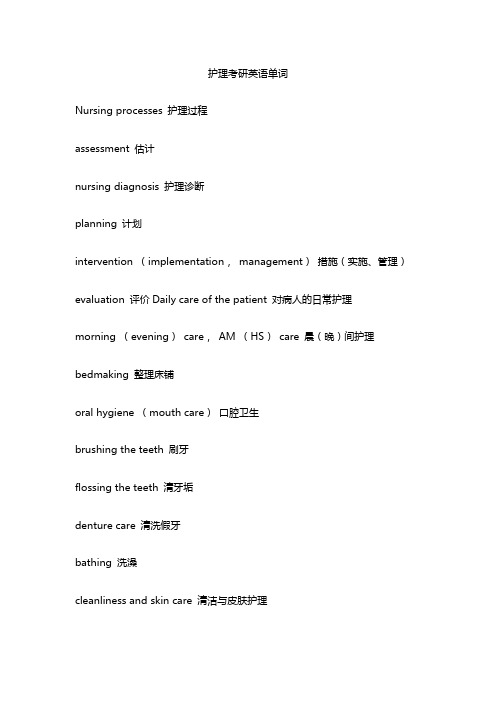
护理考研英语单词Nursing processes 护理过程assessment 估计nursing diagnosis 护理诊断planning 计划intervention (implementation,management)措施(实施、管理)evaluation 评价Daily care of the patient 对病人的日常护理morning (evening)care,AM (HS)care 晨(晚)间护理bedmaking 整理床铺oral hygiene (mouth care)口腔卫生brushing the teeth 刷牙flossing the teeth 清牙垢denture care 清洗假牙bathing 洗澡cleanliness and skin care 清洁与皮肤护理perineal care 洗会阴hair 梳头shaving 刮脸Care of nails and feet 指甲修剪和洗脚changing hospital gowns 更换住院服装massage 按摩bedsore care 褥疮护理Measurement of vital signs 测量生命体征taking oral (rectal,axillary)temperature量口腔(直肠、腋下)体温taking a radial pulse 测量桡动脉脉搏counting respirations 计呼吸次数measuring (taking)blood pressure 量血压Catheterization 导管插入术cardiac catheterization 心导管插入术laryngeal catheterization喉插管术retro-urethral catheterization 逆行导尿管插入术urethral catheterization 尿道导管插入术Clean techniques,medical asepsis 消毒灭菌asepsis 无菌(法)integral asepsis 完全无菌disinfection 消毒concomitant (concurrent)disinfection 随时消毒,即时消毒steam disinfection 蒸汽消毒terminal disinfection 终末消毒disinfection by ultraviolet light 紫外线消毒Sterilization 灭菌,消毒chemical sterilization 化学灭菌法fractional sterilization 间歇灭菌法intermittent sterilization 间歇灭菌法mechanical sterilization 器械灭菌法Decompression 减压(术)oardiac decompression 心减压术cerebral decompression 脑减压术orbital decompression 眼眶减压术decompression of decompression 心包减压术gastro-intestinal decompression 胃肠减压术decompression of rectum 直肠减压术decompression of spinal cord 脊髓减压术Dialysis透析peritoneal dialysis腹膜透析hemodialysis 血液透析Drainage 引流、导液aspiration (suction)drainage 吸引导液(引流)closed drainage 关闭引流法negative pressure drainage 负压吸引法open drainage 开放引流法postural drainage 体位引流法vaginal drainage 阴道引流法vesicocelomic drainage 膀胱腹腔引流Drainage 灌肠barium enema钡灌肠blind enema肛管排气法contrast enema对比灌肠glycerin enema甘油灌肠high (low)enema 高(低)位灌肠magnesium sulfate enema 硫酸镁灌肠retention (non-retention)enema 保留(无保留)灌肠soapsuds enema 肥皂水灌肠turpentine enema 松节油灌肠Feeding 饲,喂养Forced (forcible)feeding 强制喂养intubtaion (tube)feeding 管饲法nasal feeding 鼻饲法rectal feeding 直肠营养法Heat and clod applications 冷、热敷applying hot compresses 热敷applying hot soaks 湿热敷assisting the patient to take a sitz bath 帮病人坐浴applying hot water bottles 用热水瓶applying an ice bag (collar0 用冰袋applying cold compresses 冷敷giving a cold (an alcohol)sponge bath 冷水(酒精)擦浴Infusion 输入,注入glucose infusion 葡萄糖液输注glucose-saline infusion 葡萄糖-盐水输注saline infusion 盐水输注Injection 注射endermic (intracutaneous)injection 皮内注射hypertonic saline injection 高渗盐水注射hypodermic injection 皮下注射intramuscular injection 肌内注射intraocular injection 眼球注射intrapleural injection 胸膜腔注射intrauterine injection 子宫内注射nasal injection 鼻内注射peritoneal injection 腹膜腔注射rectal injection 直肠注射subconjunctival injection 结膜下注射urethral injection 尿道注射vaginal injection 阴道注射Irrigation 冲洗vaginal irrigation 阴道冲洗bladder irrigation 膀胱冲洗continuous irrigation 连续冲洗法mediate irrigation 间接冲洗法Isolation 隔离、分离strict isolation 严密隔离contact isolation 接触隔离respiratory isolation 呼吸隔离drainage (secretion)precautions 引流预防措施enteric precautions 肠道预防措施blood (body fluid)precautions 血液(体液)预防措施protective isolation 保护性隔离Lavage 灌洗blood (systemic)lavage 血液毒素清洗法ether lavage (腹腔内)乙醚洗法gastric lavage 洗胃intestinal lavage 洗肠peritoneal lavage 腹膜腔灌洗pleural lavage 胸膜腔灌洗Medication 药疗,投药,给药endermic medication 皮内透药法hypodermatic medication 皮下投药法intramuscular medication 肌肉投药法ionic medication 离子透药疗法nasal medication 鼻内投药法oral medication 口服法rectal medication 直肠投药法sublingual medication 舌下投药法transduodenal medication 十二指肠内投药法vaginal medication 阴道投药法Suctioning 吸气引液upper airway suctioning 上呼吸道抽吸法nasogastric suctioning 鼻胃抽吸wound suctioning 伤口吸引Transfusion 输血arterial transfusion 动脉输血blood transfusion 输血direct (immediate )transfusion 直接输血drip transfusion 滴注输(血)液indirect transfusion 间接输血plasma transfusion 输血浆serum transfusion 输血清venous transfusion 静脉输血,静脉输液Diet nursing 伙食护理absolute diet (fasting)禁食balanced diet 均衡伙食convalescent diet 恢复期饮食diabetic diet 糖尿病饮食eucaloric diet 适当热量饮食fat-free diet 无脂饮食salt-free diet 无盐饮食fever diet 热病饮食full diet 全食,普通饮食half diet 半食high caloric diet 高热量饮食high-carbohydrate diet 高糖类饮食high-protein (protein rich)diet 高蛋白饮食invalid diet 病弱者饮食light diet 易消化饮食liquid diet 流质饮食high fat diet 高脂饮食low fat diet 低脂饮食low caloric diet 低热量饮食low-protein diet 低蛋白饮食low-residue diet 低渣饮食nourishing diet 滋补饮食obesity diet 肥胖病饮食prenatal diet 孕期饮食regimen diet 规定食谱smooth (soft)diet 细软饮食Preparing the patient for the surgery 为病人手术前做准备shaving the patient's skin (skin prep)备皮anesthesia 麻醉Postoperative care 手术后护理coughing and deep-breathing exercises 咳嗽呼吸练习applying elastic stockings 穿弹性袜applying elastic bandages 用弹性绷带Emergency care (first aid)急救护理cardiopulmonary resuscitation 心肺循环复苏术mouth-to-mouth(mouth-to-nose,mouth-to-stoma)resuscitation 口对口(口对鼻,口对颈部小口)循环复苏术emergency care for fainting (shock,stroke)victims昏厥(休克、中风)患者急救emergency care used to control hemorrhage 止血急救emergency care given to help a patient who is vomiting呕吐患者急救emergency care for a patient during a seizure 癫痫发作急救hospice care 临终护理postmortem care 死后护理•。
医学院校研究生英语读与写(第三版)词汇题与及完形整理
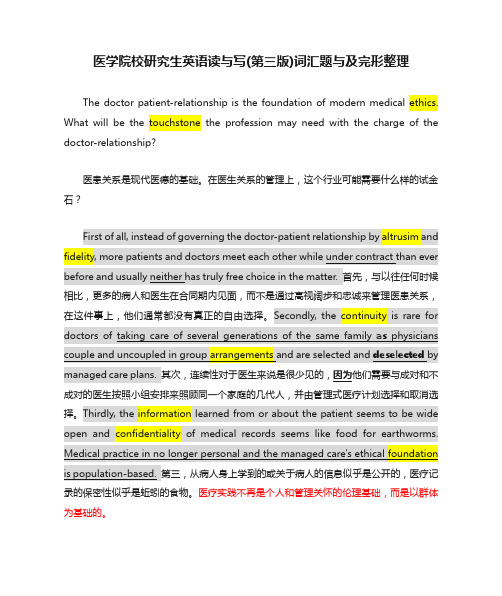
医学院校研究生英语读与写(第三版)词汇题与及完形整理The doctor patient-relationship is the foundation of modern medical ethics. What will be the touchstone the profession may need with the charge of the doctor-relationship?医患关系是现代医德的基础。
在医生关系的管理上,这个行业可能需要什么样的试金石?First of all, instead of governing the doctor-patient relationship by altrusim and fidelity, more patients and doctors meet each other while under contract than ever相比,更多的病人和医生在合同期内见面,而不是通过高视阔步和忠诚来管理医患关系,在这件事上,他们通常都没有真正的自由选择。
Secondly, the continuity is rare formanaged care plans. 其次,连续性对于医生来说是很少见的,因为他们需要与成对和不成对的医生按照小组安排来照顾同一个家庭的几代人,并由管理式医疗计划选择和取消选择。
Thirdly, the information learned from or about the patient seems to be wide open and confidentiality of medical records seems like food for earthworms. Medical practice in no longer personal and the managed care's ethical foundation录的保密性似乎是蚯蚓的食物。
- 1、下载文档前请自行甄别文档内容的完整性,平台不提供额外的编辑、内容补充、找答案等附加服务。
- 2、"仅部分预览"的文档,不可在线预览部分如存在完整性等问题,可反馈申请退款(可完整预览的文档不适用该条件!)。
- 3、如文档侵犯您的权益,请联系客服反馈,我们会尽快为您处理(人工客服工作时间:9:00-18:30)。
护理考研英语资料推荐
考研英语复习,不论对哪个专业的考生来说,都是有一定的难度的。
那么护理考研英语应该如何复习呢?大家可以看看下面的额几条建议,希望你有所收获。
一、了解熟悉护理专业考研相关信息
护理专业考研要考三门科目,政治,外语,护理综合。
政治目前你只需要上好大学的政治课,英语要好好学,最好要过6级,专业要学好护理学基础、内科护理学及外科护理学,在学习时比别的功课多用些心,到大4上学期结束后,就开始系统的考研复习这三门功课。
下面大家可以了解一下护理综合考试科目。
1.护理综合考试科目包括:
护理学基础、内科护理学及外科护理学。
2.考试比例:
护理学基础占30%(其中护理学导论占10%,基础护理学占20%)、内科护理学占40%、外科护理学占30%.
3.题型结构:
单项选择题(占60%,180分,每题1.5分,120道题,其中护理学基础36道、内科护理学48道、外科护理学36道)
多项选择题(占20%,60分,每题2分,30道题,其中护理学基础9道、内科护理学12道、外科护理学9道)
问答题(病例分析)(占20%,60分,每题20分,3道题,护理学基础1道、内科护理学1道、外科护理学1道)
考试总分300分。
4.考试时间:
3小时。
二、重视英语的备考
其实专业课的话,大家平时都有在接触。
但是对于英语的话,可能就相对有点疏忽了,建议大家最好是过了英语六级,当然,不过的话,也是没关系的,只是考研备考的话,会比较吃力一些。
英语是整个考研备考过程中不可忽视的一科。
基础不好的话,就在复习伊始,打好英语基础知识。
建议选择解析详细的资料书,最好是能够看得懂的,我当时用的北大博士吕升运的《考研圣经》,这本书还是很不错的。
三、选书要慎重
考研英语选择书籍资料是很重要的,推荐两本书给大家,一本是我用的考研圣经,这本书我都说了,很适合基础不好的人用,主要是书中的基础知识解析详细,当然他的答案解析也是很不错的,可以学到很多的做题技巧。
写作的复习,大家可以买本热点话题的作文书,我看写作宝中宝就很不错的哦!
还有就是我也考虑到了基础比较好的人啦!推荐这部分人用黄皮书复习,它主要是从命题思路和方向进行分析的,需要掌握这方面知识的,可以看看这本书。
